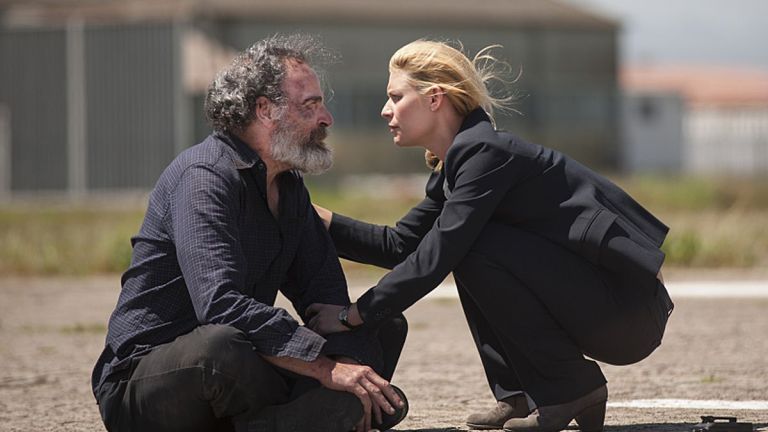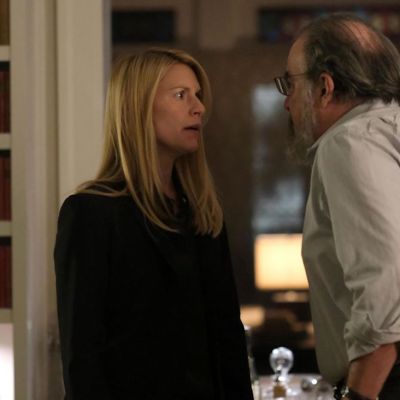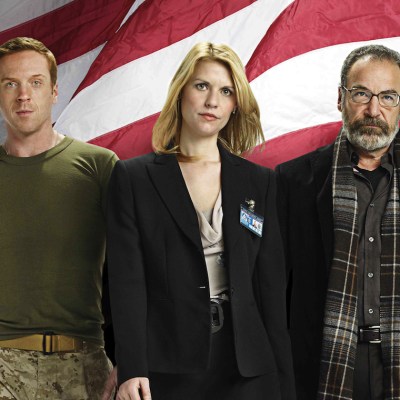Homeland, The Legacy of Carrie Mathison, and Why It’s Time to Let Go
We look back at the legacy of Showtime’s era-defining series, Homeland, and why that moment is over.

It was chilling at the time. That’s the best way to describe the opening credits of Homeland as originally presented in 2011. Premiering in the third year of Barack Obama’s presidency, and just five months after he announced to the nation that Osama bin Laden was dead, Homeland recontextualized that moment of mass American relief into being just the latest chapter in an ongoing saga—one where the cataclysmic Sept. 11, 2001 terrorist attacks masterminded by bin Laden’s al-Qaeda were not the beginning of a national moment, but simply the centerpiece of endless paranoia and dread.
Hearing the sounds of mournful jazz, viewers were introduced to Carrie Mathison as both a girl and a woman lost in a maze. This is literalized by flashes of nine-foot hedge greenery surrounding Claire Danes, and it’s also informed by another verbal soundtrack of failed “warnings” that the Reagan, Clinton, and Bush administrations ignored. All the while Carrie pledges, “I missed something once, I won’t, I can’t, let that happen again.” Mandy Patinkin’s Saul Berenson whispers back, “That was 10 years ago, everyone missed something that day.” They did, but Homeland was here to remind us that while bin Laden was dead, the menace of the post-9/11 world is here to stay.
So began one of the most important and defining television shows of the 2010s. While Homeland might have only dominated the water cooler zeitgeist during its first three years—a period when Obama himself apparently confessed that on Saturdays while his family was playing tennis, “What I’m really doing is watching Homeland DVDs”—it has outlasted its entire generation of Beltway television peers. It came up with House of Cards, Veep, and Scandal, but its longevity to outlast them can be best described as two-fold: First, it dared to extend beyond its central conflict of a bad romance between a spy and indecisive would-be terrorist (Damian Lewis’ tragic Nicholas Brody), and second, it never lost sight of its mission to remind us of the ambiguous grays Americans learned to accept as their new normal in the days, weeks, years, and decades following 9/11.
“What keeps you up at night?” Homeland executive producer Alex Gansa liked to ask Washington insiders every January before breaking a new season in the writers room. He would occasionally pose this question to actual CIA employees in Langley, for whom Homeland was a cathartic vindication on the greater mission, but he also posed it to folks who worked in the Obama White House, the State Department, and The Washington Post press room. Said Gansa, “Without Brody, we had to pick an idea to talk about over a season. That’s when ‘Spy Camp’ became really important.” Spy camp refers to anyone who would talk to Homeland writers, ranging from American generals to the exiled whistleblower Edward Snowden.
This ambition to reach for verisimilitude in its depiction of Beltway insider nightmares is what set Homeland apart from its contemporaries, and also from Gansa’s previous spy series, 24. Whereas Jack Bauer was little more than a superhero with high security clearance and an almost sadomasochistic need to resort to torture as the first, second, and third response toward all threats, Danes’ Carrie Mathison was tragically human. As a bipolar Langley analyst more comfortable in front of a bank of monitors with extralegal surveillance access to her obsessions than she ever was running into danger waving a gun (which might explain why season 5 was so disappointing), she was a more palatable version of a “superspy” during the Obama years.
Her failings also allowed Homeland to evolve, both responding and predicting the crises of its times. This spanned from season 3’s plotline involving the installation of Brody as a spy inside the Iranian regime serendipitously coinciding with the Iran nuclear deal, to season 6 getting the gender of the next president-elect wrong, but being right about the rise of social media misinformation created by state sponsored bot farms. It’s no wonder former CIA Director John Brennan told Showtime executive Gary Levine, “I don’t know what your show is, but I know it matters to my people.”
Yet if in its best moments Homeland reflected the anxieties and fears of Langley and the country’s larger intelligence apparatus, it’s then also been a specific reflection of that specific and sometimes narrow worldview. One, like so much else of American life, shaped by clouds of horror that descended with the Twin Towers on a September morning, and which is previewed at the top of every hour of Homeland.
In a recent article for The Atlantic, Ben Rhodes, a former deputy national security adviser to Obama, recalls how inside of a windowless room in the bowels of the CIA, there is a sign that reads, “Every day is September 12th.” It was a sentiment he agreed with when he saw the towers come down in person in 2001, leading to a career in Washington, but by the mid-2010s, he had developed reservations.
Homeland’s legacy likewise is marred by reservations toward the post-9/11 world, yet it is still defined by it. If 24 was the rah-rah jingoistic fantasy that imagined excuses for every bad action committed during the 2000s, Homeland was the more self-reflective and somber reevaluation of those deeds 10 years on. And yet, it is still defined by a desire to achieve a greater net good by playing by the rulebook set-up to, in Carrie’s words, “Make sure we don’t get hit again.”
Hence how a 44th president who ran on ending the Iraq War could also escalate a drone program that left hundreds of civilians dead. Homeland echoed this in its fourth season by turning Carrie Mathison into the “Drone Queen.” As the station chief in Kabul, she signed off on every drone strike, including one that finally shook her conviction when she discovered it left hundreds in a wedding party dead.
That sense of self-awareness still bedevils career public servants, if not their current political leadership, and yet even after the Obama years ended, the political influence of 9/11 did not. Homeland’s renaissance in its later seasons focused on Russian interference and rogue presidencies, but the real world White House leadership inspiring these narratives came to power partially by campaigning on post-9/11 xenophobia and bigotry toward Muslims, who would be “banned” from entering the country.
That campaign promise of a “90-day ban” of Syrian refugees turned into a years-long reality. And it existed still when the same 45th President of the United States exited the Iran nuclear deal, primarily because of its status as part of his predecessor’s legacy. He likewise followed suit by taking America to the brink of war with Iran in the same month that the World Health Organization eventually declared a public state of emergency due to the growing spread of the coronavirus outbreak, and the COVID-19 disease it caused. But by this point the POTUS had also inexplicably disbanded the National Security Council’s global health security office, but then that too was a part of Obama’s legacy.
It’s worth noting these current real world events that are leaving Americans sheltering in place because of how jarring their juxtaposition is with the world found in the final season of Homeland. While television writers can be forgiven for not predicting a global pandemic would occur in 2020, the show’s last year is very much about staring into the abyss of the post-9/11 world.
In the Showtime series’ fictional alternate history, a new inexperienced and weak minded president (Sam Trammell) took the U.S. to the brink of nuclear war with Pakistan in order to look strong after a seeming terrorist attack left his predecessor dead. The fact that President Warner (Beau Bridges) actually died in a helicopter crash caused by a mechanical malfunction is obscured by the drumbeat of needing someone to blame, and someone to bomb. It’s intentionally meant to echo the George W. Bush administration’s drumbeat to war with the Saddam Hussein regime in the early 2000s.
“When those helicopters went down, two things changed in my country,” Saul Berenson lamented in season 8. “An inexperienced president came to power, and the American people were wounded, demanding action. We know what happens next, we’ve been here before. How does a weak president show he’s strong? He goes to war. And that’s what will happen again unless sensible people can put aside their differences.”
The final season of Homeland, like the show as a whole, ties its legacy to learning from the sins of the past, and the sins created by the War on Terror that inspired it. Can we avoid invading the wrong country again because of fear, hysteria, or poor leadership? Homeland is a series defined by that post-9/11 mindset where every day is Sept. 12. And that means tomorrow could be March 20, 2003—the day America invaded Iraq under the assumption of the country having weapons of mass destruction and the then already disproven pretense that the Hussein regime was in league with al-Qaeda.
In some ways, it’s fair to say we’ve never left that Sept. 12 worldview. We saw it last January when a POTUS, who shredded a credibly working nuclear deal, took actions that resulted in Iran firing missiles at a base housing American soldiers. Yet how out of step and senseless that all seems in a new, new normal where COVID-19 has brought the American people and economy to its knees.
As of the time of writing, COVID-19 has killed more than 51,000 Americans. Within a week, that number will surpass how many Americans died because of the Vietnam War. The level of challenge presented by the coronavirus pandemic is arguably greater than anything facing the U.S. since World War II. And like that global conflict, Vietnam, or, yes, 9/11, the long-term effects of COVID-19 cannot be truly predicted, especially while we’re still in the midst of the crisis. The only thing clear is the paradigm has shifted, possibly for the first time since Sept. 12. Suddenly Homeland’s anxiety, and bombs targeting Iranian generals, appear to be fighting the last war.Perhaps that war is truly over now, and Homeland is just one more product of that time we now must leave behind. It’s a time capsule of its era… but that era has passed.


